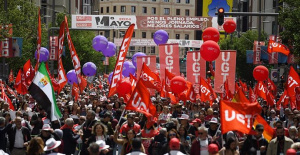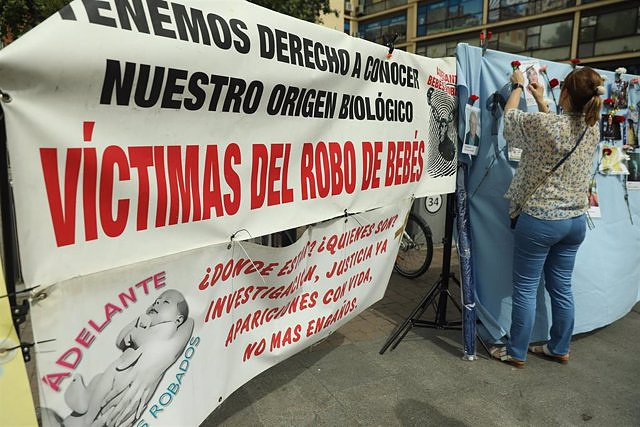The processing of this norm can open another gap between the government partners given their antagonistic positions
MADRID, 2 Mar. (EUROPA PRESS) -
The PSOE wants to reduce in Congress the content of the bill on stolen babies that it signed with its parliamentary partners and that Unidas Podemos urged to unblock. Among other proposals, the socialist amendments change the name and the statement of reasons, substitute the concept of victim for affected, suppress the criminal effects by referring to the Penal Code and eliminate the proposal to create a Special Prosecutor's Office.
This bill was registered in February 2020 with the signature of the PSOE, Unidas Podemos, ERC, Bildu, PNV, Junts, Más País-Equo, Compromís, the BNG and the CUP. Due to quota issues, so that it would not be prevented from defending other initiatives, United We Can withdrew its signature some time later, although not its support.
The text was taken into consideration by the Plenary Session of Congress in June of that year, with the only vote against being Vox, but since then it has been kept in a drawer and the terms for amendments have been extended for two and a half years. At the beginning of this year, Unidas Podemos demanded that the PSOE reactivate its processing and, after several weeks, the Socialists finally agreed to put an end to the period for presenting amendments.
But when the PSOE has registered its own, to which Europa Press has had access, its idea is already very different from what it signed in 2020 because now it wants to change the name and the explanatory statement of the law, as well as a good part of its key points.
From the outset, he does not want the law to be called "stolen babies" and proposes to rename it "proposal for a law on guarantees for those affected by the abduction of newborns", consistent with instructions from the Ministry of the Interior on the matter.
In addition, he no longer speaks of "crime victims" in the case of stolen babies, but of "people affected by the abduction of newborns", and he intends to eliminate from the preamble the allusion to an order of the Central Investigating Court of the National Court of which Baltasar Garzón was the headline, in which there was talk of 30,000 children separated from their mothers, since he considers that such a figure is "a conjecture".
The PSOE also limits the scope of application of the norm: "It is considered pertinent to limit the consideration of affected to the relatives of a person abducted in a straight line and up to the second degree of collaterality, which would include a reasonable number of people" , holds.
Likewise, it intends to remove from the law any reference to criminal consequences, since it considers that the Penal Code "already has enough criminal offenses to prosecute this type of crime", and calls for focusing the rule on "guaranteeing the rights to the truth". In other words, his idea is to make it easier for those affected to access the information they need, but not so much to point out the culprits of what happened.
In this sense, the Socialist Group considers that the law should only contemplate the compensation agreed by the Justice in accordance with the current legal system and now rejects the idea of creating a Specific Prosecutor's Office on stolen babies, alleging that the General Prosecutor's Office has already signed a collaboration agreement on this issue with the ministries of Justice, Interior and Health in 2013, when the PP governed with an absolute majority.
On the other hand, the PSOE avoids charging the inks in the demands of information to the Church and, rather than assessed mandates under threat of lawsuit, prefers to bet on collaboration agreements with the Episcopal Conference, remembering that relations with the Catholic Church are regulated in the agreement with the Holy See.
And with respect to the State Bank of DNA that appeared in the original initiative, the PSOE now refers to the regulation provided for in the already current Law of Democratic Memory "to avoid overlapping functions and regulatory dispersion."
In view of these amendments, the processing of this law may open another gap with United We Can and with the parliamentary allies of the Government, since the philosophy of the PSOE is very different from that proposed by the other formations.

 Exploring Cardano: Inner Workings and Advantages of this Cryptocurrency
Exploring Cardano: Inner Workings and Advantages of this Cryptocurrency Seville.- Economy.- Innova.- STSA inaugurates its new painting and sealing hangar in San Pablo, for 18 million
Seville.- Economy.- Innova.- STSA inaugurates its new painting and sealing hangar in San Pablo, for 18 million Innova.- More than 300 volunteers join the Andalucía Compromiso Digital network in one month to facilitate access to ICT
Innova.- More than 300 volunteers join the Andalucía Compromiso Digital network in one month to facilitate access to ICT Innova.-AMP.- Ayesa acquires 51% of Sadiel, which will create new technological engineering products and expand markets
Innova.-AMP.- Ayesa acquires 51% of Sadiel, which will create new technological engineering products and expand markets UGT and CCOO demand the regeneration of democracy, better salaries and a reduction in working hours
UGT and CCOO demand the regeneration of democracy, better salaries and a reduction in working hours Alcaraz gives up his reign in Madrid against Rublev
Alcaraz gives up his reign in Madrid against Rublev Petro announces that Colombia will break diplomatic relations with Israel
Petro announces that Colombia will break diplomatic relations with Israel The Fed maintains rates and gives the ECB the initiative to reverse monetary restriction
The Fed maintains rates and gives the ECB the initiative to reverse monetary restriction How Blockchain in being used to shape the future
How Blockchain in being used to shape the future Not just BTC and ETH: Here Are Some More Interesting Coins Worth Focusing on
Not just BTC and ETH: Here Are Some More Interesting Coins Worth Focusing on Ivace and promotes a less invasive device for the early detection of prostate cancer
Ivace and promotes a less invasive device for the early detection of prostate cancer Valencia unanimously approves the ordinance to allocate spaces to test innovative initiatives
Valencia unanimously approves the ordinance to allocate spaces to test innovative initiatives UPV researchers promote a paid master's degree as a "talent factory" in integrated photonics
UPV researchers promote a paid master's degree as a "talent factory" in integrated photonics A spin-off of the UV works on obtaining high-resolution 3D biomedical images in real time
A spin-off of the UV works on obtaining high-resolution 3D biomedical images in real time A million people demonstrate in France against Macron's pension reform
A million people demonstrate in France against Macron's pension reform Russia launches several missiles against "critical infrastructure" in the city of Zaporizhia
Russia launches several missiles against "critical infrastructure" in the city of Zaporizhia A "procession" remembers the dead of the Calabria shipwreck as bodies continue to wash up on the shore
A "procession" remembers the dead of the Calabria shipwreck as bodies continue to wash up on the shore Prison sentences handed down for three prominent Hong Kong pro-democracy activists
Prison sentences handed down for three prominent Hong Kong pro-democracy activists ETH continues to leave trading platforms, Ethereum balance on exchanges lowest in 3 years
ETH continues to leave trading platforms, Ethereum balance on exchanges lowest in 3 years Investors invest $450 million in Consensys, Ethereum incubator now valued at $7 billion
Investors invest $450 million in Consensys, Ethereum incubator now valued at $7 billion Alchemy Integrates Ethereum L2 Product Starknet to Enhance Web3 Scalability at a Price 100x Lower Than L1 Fees
Alchemy Integrates Ethereum L2 Product Starknet to Enhance Web3 Scalability at a Price 100x Lower Than L1 Fees Mining Report: Bitcoin's Electricity Consumption Declines by 25% in Q1 2022
Mining Report: Bitcoin's Electricity Consumption Declines by 25% in Q1 2022 Oil-to-Bitcoin Mining Firm Crusoe Energy Systems Raised $505 Million
Oil-to-Bitcoin Mining Firm Crusoe Energy Systems Raised $505 Million Microbt reveals the latest Bitcoin mining rigs -- Machines produce up to 126 TH/s with custom 5nm chip design
Microbt reveals the latest Bitcoin mining rigs -- Machines produce up to 126 TH/s with custom 5nm chip design Bitcoin's Mining Difficulty Hits a Lifetime High, With More Than 90% of BTC Supply Issued
Bitcoin's Mining Difficulty Hits a Lifetime High, With More Than 90% of BTC Supply Issued The Biggest Movers are Near, EOS, and RUNE during Friday's Selloff
The Biggest Movers are Near, EOS, and RUNE during Friday's Selloff Global Markets Spooked by a Hawkish Fed and Covid, Stocks and Crypto Gain After Musk Buys Twitter
Global Markets Spooked by a Hawkish Fed and Covid, Stocks and Crypto Gain After Musk Buys Twitter Bitso to offset carbon emissions from the Trading Platform's ERC20, ETH, and BTC Transactions
Bitso to offset carbon emissions from the Trading Platform's ERC20, ETH, and BTC Transactions Draftkings Announces 2022 College Hoops NFT Selection for March Madness
Draftkings Announces 2022 College Hoops NFT Selection for March Madness



























